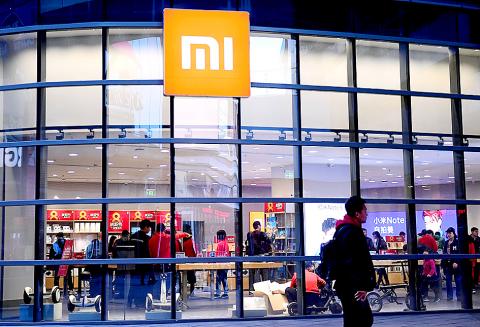Chinese smartphone maker Xiaomi Corp (小米) yesterday filed documents with Hong Kong’s stock exchange operator for an initial public offering (IPO) that could be the world’s biggest share sale in years.
Beijing-based Xiaomi is the world’s fourth-biggest smartphone maker by shipment volume, according to International Data Corp.
The listing documents provided no financial details about the share sale or the company’s valuation.

Photo: Reuters
The South China Morning Post cited unnamed banking sources as saying Xiaomi plans to raise up to US$10 billion in a deal that would value the company at US$100 billion.
That would make it the biggest IPO since Chinese e-commerce giant Alibaba Group Holding Ltd’s (阿里巴巴) US$21.8 billion IPO in 2014 on the New York Stock Exchange.
Xiaomi, founded in 2010, has expanded rapidly on the strength of smartphone handsets priced as low as US$115 and Internet-based marketing and distribution.
The listing documents offered a glimpse of Xiaomi’s finances, with the company reporting that revenue rose by two-thirds last year to 114.6 billion yuan (US$18 billion), including 80 billion yuan from its smartphone division.
Xiaomi’s business also includes partnering with “Internet of Things” companies to develop hundreds of connected lifestyle devices, such as rice cookers, robot vacuum cleaners and coffee makers.
Operating profit tripled to 12.2 billion yuan, but the company still lost nearly 44 billion yuan last year, mainly due to the cost of converting preferred shares held by investors.
Xiaomi’s decision to go public in Hong Kong comes days after the territory’s stock exchange loosened listing rules, an apparent vindication of its efforts to better compete with rival bourses in the race for blockbuster offerings.
Xiaomi is applying for a Hong Kong stock listing with dual share classes that give certain shareholders much more power, which the new rules allow.
The exchange modified its regulations to accommodate such companies after losing Alibaba’s dual-class listing to New York because rules at the time only allowed a single share class.

Nissan Motor Co has agreed to sell its global headquarters in Yokohama for ¥97 billion (US$630 million) to a group sponsored by Taiwanese autoparts maker Minth Group (敏實集團), as the struggling automaker seeks to shore up its financial position. The acquisition is led by a special purchase company managed by KJR Management Ltd, a Japanese real-estate unit of private equity giant KKR & Co, people familiar with the matter said. KJR said it would act as asset manager together with Mizuho Real Estate Management Co. Nissan is undergoing a broad cost-cutting campaign by eliminating jobs and shuttering plants as it grapples

TEMPORARY TRUCE: China has made concessions to ease rare earth trade controls, among others, while Washington holds fire on a 100% tariff on all Chinese goods China is effectively suspending implementation of additional export controls on rare earth metals and terminating investigations targeting US companies in the semiconductor supply chain, the White House announced. The White House on Saturday issued a fact sheet outlining some details of the trade pact agreed to earlier in the week by US President Donald Trump and Chinese President Xi Jinping (習近平) that aimed to ease tensions between the world’s two largest economies. Under the deal, China is to issue general licenses valid for exports of rare earths, gallium, germanium, antimony and graphite “for the benefit of US end users and their suppliers

Dutch chipmaker Nexperia BV’s China unit yesterday said that it had established sufficient inventories of finished goods and works-in-progress, and that its supply chain remained secure and stable after its parent halted wafer supplies. The Dutch company suspended supplies of wafers to its Chinese assembly plant a week ago, calling it “a direct consequence of the local management’s recent failure to comply with the agreed contractual payment terms,” Reuters reported on Friday last week. Its China unit called Nexperia’s suspension “unilateral” and “extremely irresponsible,” adding that the Dutch parent’s claim about contractual payment was “misleading and highly deceptive,” according to a statement

The Chinese government has issued guidance requiring new data center projects that have received any state funds to only use domestically made artificial intelligence (AI) chips, two sources familiar with the matter told Reuters. In recent weeks, Chinese regulatory authorities have ordered such data centers that are less than 30 percent complete to remove all installed foreign chips, or cancel plans to purchase them, while projects in a more advanced stage would be decided on a case-by-case basis, the sources said. The move could represent one of China’s most aggressive steps yet to eliminate foreign technology from its critical infrastructure amid a